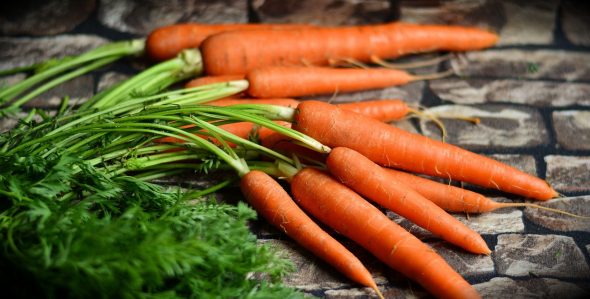
The Connection Between Healthy Habits and Your Vision
Posted May 24, 2021Ever since we were kids, we’ve heard over and over again about the importance of eating fruits and vegetables. When it came to carrots, the rumor was that eating them would give us better eyesight. Adults made it sound as if we’d develop x-ray vision from the power of carrots alone! So here’s the question: Is what we always heard actually true? Does eating carrots protect or promote good vision?
The answer is yes and no! Carrots (or any orange food that produces beta-carotene) help our eyes perform essential functions, so they are important to our vision. However, eating them won’t improve eyesight or prevent you from needing glasses if you already wear them. Still, ensuring you get the daily recommended servings of fruits, vegetables (carrots included), and other essential nutrients is extremely important. There’s a strong connection between maintaining healthy habits and protecting your eyes.
How Do Carrots Help Me See?
The link between carrots and eyesight is based on real science. Carrots contain a pigment called beta-carotene, which gives them their orange color. The body uses beta-carotene to make vitamin A, an essential nutrient. Your eyes need vitamin A to convert light into a signal that can be interpreted by your brain. Getting enough vitamin A in your diet can help ensure you’ll be able to see in situations where it might otherwise be difficult, like in low light.
Every year, an estimated quarter-million to half a million people will lose their sight due to a vitamin A deficiency—but that’s pretty unlikely to happen in the United States. Most Americans have access to enough nutritious foods that they consume sufficient vitamin A even without eating a bunch of extra orange vegetables.
Other Important Foods
It turns out, carrots aren’t even the most helpful food when it comes to keeping your eyes healthy! Sweet potatoes, for example, provide more vitamin A than carrots. Dark green, leafy vegetables, including kale and spinach, also contain vitamins that support nerves inside the eye.
According to the American Optometric Association, getting plenty of vitamin C, E and zinc can do more than just help your sight; it can reduce your risk of serious eye conditions like macular degeneration and cataracts.
You can find vitamin C in fruits like oranges, grapefruits and strawberries. Nuts and oils are also a great source of vitamin E. To get your recommended dose of zinc, you can eat red meat, oysters or other shellfish. Vitamin A is also fat-soluble, so eating foods rich in vitamin A alongside something fatty will help your body digest and use the important nutrient.
Avoiding Other Health Risks
As we all know, though, committing to healthy habits goes beyond what’s on your plate at meal time. There are other health risks you should try to avoid, to keep your eyes in tip-top shape. For example, being diabetic is a risk factor for diabetic eye disease. Diabetes is not always related to personal nutrition, but adults can develop diabetes (Type II) in part due to weight gain or an unbalanced diet. At Invision, we counsel diabetic patients on lifestyle changes and the ABCs of diabetes control to prevent vision loss.
Finally, don’t smoke! The drawbacks to smoking are obvious, from decreased lung capacity to the risk of cancer. However, smoking cigarettes can also create problems for your eyes. Smoking increases the risk of macular degeneration, cataracts and glaucoma, by as many as three to four times.
Your eyesight is precious and taking easy steps to stay healthy overall can keep your eyes healthy, too. If you’re experiencing issues with your vision or have questions about the best practices for protecting your eyesight, schedule a consultation with the experienced doctors at Invision. We’d love to support you.
